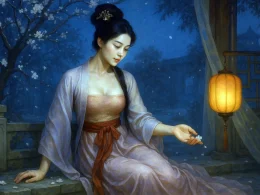Li Bai is unrivalled in verse;
He towers in the universe.
Fresher than Yu on northern shore;
Brighter than Bao, poet of yore.
I long for him as longing tree;
At sunset will he think of me?
When may we drink a cup of wine
And talk about prose and verse fine?
Original Poem:
「春日忆李白」
杜甫
白也诗无敌,飘然思不群。
清新庾开府,俊逸鲍参军。
渭北春天树,江东日暮云。
何时一樽酒,重与细论文。
Interpretation:
This poem was written in the spring of the fifth or sixth year of the reign of Emperor Xuanzong (746 or 747 AD) when Du Fu was living in Chang'an. Du Fu and Li Bai met in Luoyang in the third year of the Tianbao era (744 AD), forming a deep friendship. They traveled together to Songzhou and later to Daliang City. After parting, Li Bai went to Jiangdong, while Du Fu returned to Chang'an. During his time in Chang'an, Du Fu wrote many poems in memory of Li Bai, and this is one of them.
First Couplet:
白也诗无敌,飘然思不群。
"Li Bai's poetry is unmatched, and his extraordinary thoughts set him apart."
Du Fu begins with fervent praise for Li Bai's poetic talent, claiming that Li Bai's poetry is unparalleled at the time. His talent and thoughts transcend the ordinary, with his works being lofty, unique, and exceptional.
Second Couplet:
清新庾开府,俊逸鲍参军。
"Li Bai's poetry is as fresh as Yu Xin's and as graceful as Bao Zhao's."
In this couplet, Du Fu praises Li Bai's poetic style by comparing it to two famous ancient poets: Yu Xin, known for his freshness, and Bao Zhao, known for his elegance. By doing so, Du Fu emphasizes the unique charm of Li Bai's poetry while drawing comparisons to the admired works of these historical figures.
Third Couplet:
渭北春天树,江东日暮云。
"I watch the spring trees in the north of Wei, while you gaze at the evening clouds in Jiangdong."
This couplet reflects the geographical and emotional distance between Du Fu and Li Bai. Du Fu, in Chang'an, sees the spring trees, while Li Bai is far away in Jiangdong, gazing at the evening clouds. These seemingly simple depictions of nature subtly convey the longing and sorrow resulting from their separation.
Fourth Couplet:
何时一樽酒,重与细论文。
"When will we again meet, raise a cup together, and discuss poetry in detail?"
Du Fu expresses his deep longing for Li Bai and his desire for a reunion. He recalls the times they shared drinking and discussing poetry and expresses a strong wish to meet again and engage in such discussions once more.
Writing Features
- Interweaving Praise and Nostalgia
One of the main features of this poem is Du Fu's expression of nostalgia through high praise for Li Bai. From the opening line "Li Bai's poetry is unmatched" to the references to the freshness and grace of his poetry, Du Fu offers lavish praise, reflecting the high regard in which Li Bai is held in Du Fu's heart. This praise is rooted in Du Fu's deep yearning and respect for Li Bai. - Using Natural Imagery to Convey Emotions
Du Fu skillfully integrates natural imagery with personal emotions. Through descriptions like "spring trees in the north of Wei" and "evening clouds in Jiangdong," Du Fu not only depicts the environments in which they live but also conveys the emotional turbulence caused by their separation. These descriptions, while seemingly simple, carry profound emotional meaning and add depth to the poem's emotional layers. - Concise Language and Profound Emotion
Du Fu's language is concise and straightforward, without ornate rhetoric, yet it conveys deep and sincere emotions. In the line "When will we again meet, raise a cup together," Du Fu expresses his inner longing and reluctance through a simple question. Although the lines are simple, they deeply resonate with readers, showcasing the poet's genuine and profound emotions. - Clear Structure and Gradual Development
The structure of the poem is clear and well-organized. It begins with praise for Li Bai's poetic talent, then moves to the expression of longing, and ends with the desire for a reunion. The emotional progression is gradual and natural, with each couplet connecting to the previous one. This creates a cohesive flow of feelings, demonstrating Du Fu's skillful composition and the natural development of emotions. - Artistic Technique of Using Nature to Express Feelings
Du Fu excels at using nature to express inner emotions, and this technique is evident throughout the poem. Whether through "spring trees" to convey his longing for Li Bai or "evening clouds" to depict the distance between their hearts, the natural imagery is not merely a description of the environment but a reflection of the poet's emotions. This technique allows Du Fu's inner world to be vividly and authentically presented. - Sincerity and Depth of Emotion
The emotions expressed in this poem are sincere and profound. Even though Li Bai is far away in Jiangdong, Du Fu uses this poem to convey his deep affection for his friend. The emotions extend beyond a mere remembrance of friendship and include a high appreciation for the poetic art and a shared literary longing, showing Du Fu's admiration and the void in his heart.
Overall Appreciation
The poem begins with praise for Li Bai's poetic talent, then naturally transitions into Du Fu's deep nostalgic feelings for Li Bai, and concludes with the desire for a reunion. Through the depiction of natural imagery, such as "spring trees" and "evening clouds," Du Fu intertwines his feelings of longing and emotional connection with Li Bai. The use of simple language and vivid imagery allows Du Fu's admiration and nostalgia for Li Bai to be expressed vividly.
Du Fu's profound friendship with Li Bai, combined with his appreciation for Li Bai's poetry, demonstrates his sincere nostalgia for their relationship. This emotional expression not only reflects the deep bond between the two poets but also highlights Du Fu's high evaluation of Li Bai's poetic works.
Inspiration
This poem begins with praise for poetry, gradually leading to the emotional fluctuations in the poet's heart, and cleverly combines natural imagery with emotion. Through this work, Du Fu not only expresses his admiration for Li Bai but also deeply conveys the precious and eternal nature of their friendship. The emotions in the poem are sincere and profound, with simple yet expressive language, showcasing Du Fu's extraordinary poetic talent and emotional depth. This poem is not only a heartfelt tribute to a friend but also a profound appreciation of Li Bai's poetic art.
Poem translator:
Xu Yuan-chong (许渊冲)
About the poet

Du Fu (杜甫), 712 - 770 AD, was a great poet of the Tang Dynasty, known as the "Sage of Poetry". Born into a declining bureaucratic family, Du Fu had a rough life, and his turbulent and dislocated life made him keenly aware of the plight of the masses. Therefore, his poems were always closely related to the current affairs, reflecting the social life of that era in a more comprehensive way, with profound thoughts and a broad realm. In his poetic art, he was able to combine many styles, forming a unique style of "profound and thick", and becoming a great realist poet in the history of China.












